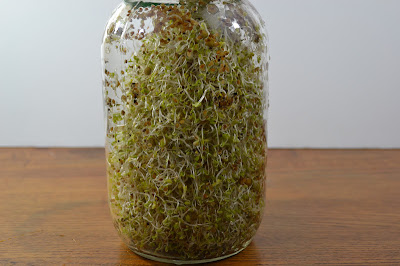
Sprouts have long been considered wonder foods, being one of the freshest and most nutritious of all vegetables. Sprouts are very alkalizing, and are high in in vitamins A, B and C and rich in minerals such as iron, calcium, and potassium. They are also high in fiber and omega 3 fatty acids.
Most of you are probably familiar with alfalfa or clover sprouts (the kind you're most likely to see on salads or sandwiches) or mung bean sprouts (those crunchy white sprouts integral to Asian cuisine), but you can sprout almost any seed or bean. Even wheat and spelt can be sprouted and used to make bread.
Most people think that growing your own sprouts is a difficult task, but it couldn't be easier! All you need is some seeds, a glass jar with a mesh screen, some water and about two minutes a day to rinse and drain your sprouts. A clamshell of sprouts will usually set you back $2-3, which considering how nutrient dense they are, isn't a bad price. However, purchasing your own seeds for sprouting is inexpensive and growing them from seed will ensure that you have the freshest sprouts possible!
Make sure you purchase high quality beans/seeds for sprouting. Health food stores or on-line shops sell an abundance of seeds and beans, however, you may have difficulty sprouting regular 'ol beans and seeds from the grocery store because they are sometimes treated with enzyme inhibitors to prevent the sprouting process. Avoid using seeds packaged for gardens because they may be treated with pesticides.
I invested in a sprouting jar fitted with a perforated lid which makes the rinsing/draining process easy peasy, but you could also use a mason jar and purchase a mesh screen (either plastic or metal).
Fortunately, I was able to find all of the above supplies at my local co-op, but the sprout people, an online company, has everything you need to get started.
Before you begin:
Make sure your sprouting jar is clean and sanitized to prevent the growth of bacteria or molds.
A little goes a long way with those seeds! Most expand 8 times their original volume, so using as little as 1 -2 tablespoons of seeds will yield several cups of sprouts.
Happy sprouting!
Sprouting seeds (lentil , clover, radish and alfalfa).
Soak 3-4 T. of seeds in a sprouting jar or a mason jar fitted with a mesh screen in enough cold filtered water to cover by 5 inches. Let sit on the countertop for 24 hours.
After your sprouts have been soaking for a day, drain thoroughly. Fill the jar half way with cold filtered water and swish your seeds around a bit. Drain again and place the jar in a bowl positioned at a 45 degree angle. Repeat the rinsing/ draining process two to three times a day (I usually do it twice: in the morning and before I go to bed) returning the jar to it's tilted position each time. The amount of time it will take for your seeds to fully sprout will vary from seed to seed and factors such as temperature an humidity. This blend takes 5-6 days total (counting soak time)
24 hours after our initial draining.
48 hours later.
72 hours later.
And... we got sprouts! On the final day I like to place my jar on a windowsill, exposing it to sunlight for a couple hours. This allows the sprouts to develop chlorophyll, turning them from yellow to light green.
Once your sprouts are done, transfer them to a tight fitting container lined with paper towels to absorb any excess moisture.








No comments:
Post a Comment